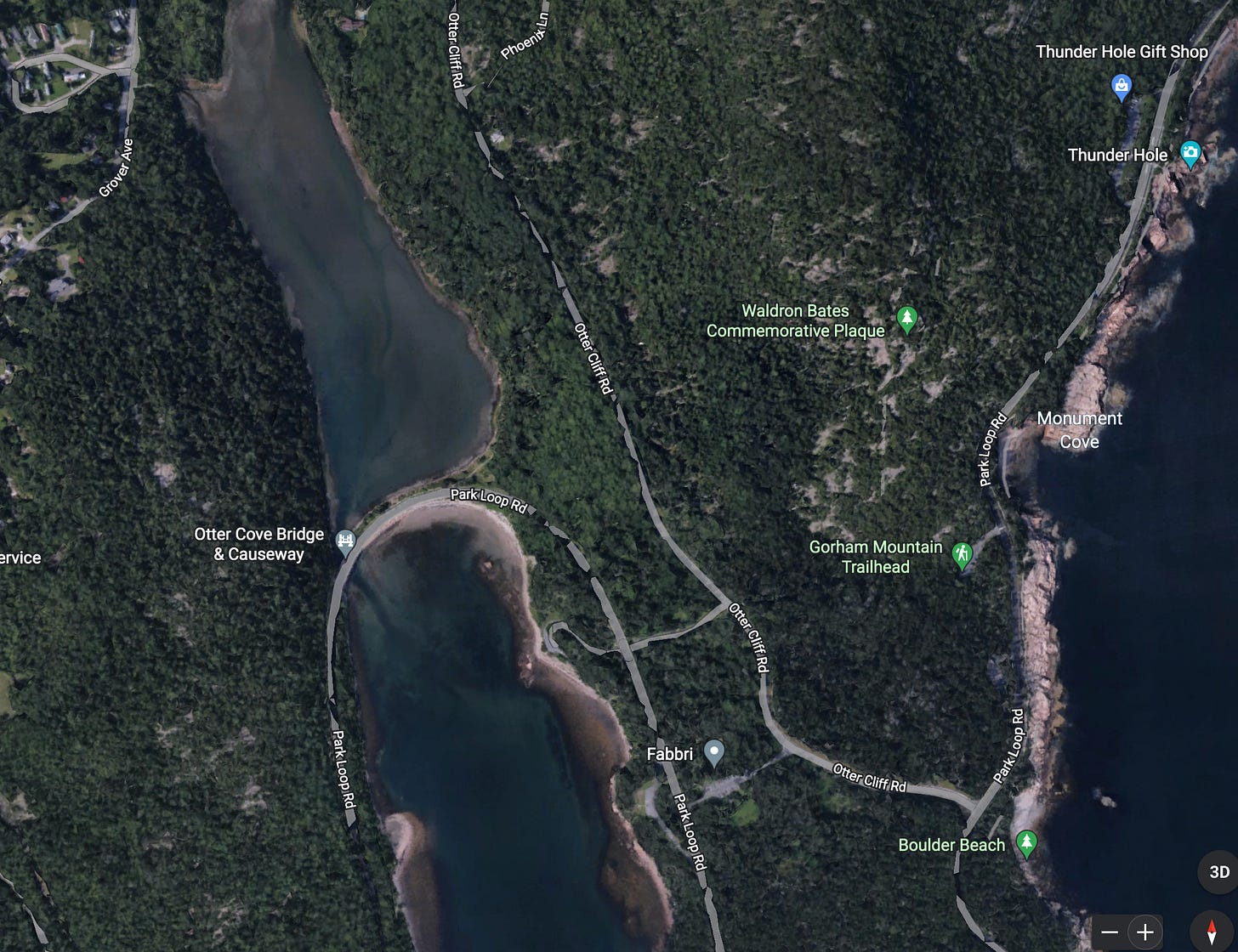Judge delays Hampden plant sale to mull creditors' concerns; SWH police asked to harass Charlotte's lobster pound again
Other news: new state law abating taxes sows confusion; MD asks Otter Creek bridge be redesigned or removed
SOMESVILLE, June 25, 2020 - In a surprise ruling Friday, a Maine Superior Court judge halted the June 30 sale of the Hampden recycling plant, saying there was enough evidence provided by creditors to deliberate the matter further.
Judge William Anderson, in a hastily worded ruling, offered to hold another hearing Friday July 1 so that he may expedite the final decision whether to order the sale to proceed.
Three vendors who are owed about $2.5 million sued to halt the sale lest they fall back further in the line of creditors who are owed money.
“If I were to sign the proposed order I would be implicitly finding that the Bank Trustee has priority without first giving CP and SNC Lavalin fair opportunity to present evidence and argument concerning the order of priority among the facility’s secured creditors,” Anderson wrote. “I do not believe that I have the authority to approve the sale while ignoring the claims of the secured objectors.”
CP Manufacturing supplied equipment the plant needed, and SNC Lavalin is a contractor. Bangor Natural Gas is also a creditor.
The ruling was a setback for MRC lawyer Jon Pottle who urged the judge at a hearing Tuesday to allow the closing on June 30, saying the MRC had a short window to restart the plant.
The MRC ended up as the only buyer after a court receiver failed to find a qualified buyer for only $1.65 million, a fraction of the $52 million bond principal. The MRC has no experience as an operator. What makes it think it can raise $20 million, which the MRC stated in its own words as the amount needed to restart the plant, and manage such a complicated enterprise successfully?
The MRC and the receiver of the plant operator sought to execute the final “stalking horse” bid which in itself was an acknowledgement of the depth of the collapse of this quixotic $90 million project.
To wit:
The MRC, the waste-disposal consortium of almost a third of Maine towns for three decades, began 10 years ago to break away from its long-term commitment with an incinerator in Orrington. It had a better idea and charted a path to rely on new technology and was sold on a “state-of-the-art” plant in Hampden. The MRC acquired the land to house the plant.
The MRC held a polarizing vote in 2016 to ask its 187 members: Orrington or us? About two third of the towns went with the MRC.
A new company, Coastal Resources of Maine, was formed to operate the plant using new technology from Fiberight Corp. The principal funder was Ultra Capital.
Ultra Capital insisted on NAES Corp., a company with little experience in operating a waste plant, as the principal operator.
It took a year’s delay to open the plant in 2019.
The plant operated about six months before financial collapse. The cash intensive operation could not make payroll nor pay its bills,
The MRC failed to guard its member interests with a hands-off approach even though it handed over the prize of 115 “joinder agreements” in which municipalities ceded all waste disposal control to the MRC and its assignee until 2038. It is the second largest creditor with more than $6 million in loans, Pottle told the judge.
The white elephant plant has been closed for 25 months since then.
Pottle did his best to convince Judge Anderson that there is an exigent public need to restart the plant. He made it sound like the towns were desperately calling out for the MRC to restart.
In fact the towns are operating as they did before the Hampden plant fiasco. They are sending trash to Orrington to be burned, the rest to landfills and the recyclables sold to the aftermarkets - just like in the 1990s. Just like pre MRC except the MRC is now extracting a middleman tax.
Pottle played the environment card, with exaggerations as to the actual effectiveness of the Hampden plant. Judge Anderson paid lip service to that entreaty but then leaned on legal arguments around lien holder rights.
Pottle personally has a lot a stake in the MRC, as do its long-time technology consultant George Aronson, who has been advising the MRC for a decade. Pottle’s wife is an employee of the MRC. He has a double economic interest. How does that color his advice? The QSJ would like to know, except the MRC is a secret organization with executive director Michael Carroll rarely answering my questions and virtually all its business conducted in executive session.
Lawyers on both sides were surprised that the judge did not approve the sale date of June 30.
The clock now is working against the MRC’s “stalking horse” plan which it launched in April. After 108 prospective buyers were contacted, not a single one qualified. What does that say about the plant that a fire sale failed to produce a viable buyer? What do they know that the MRC doesn’t?
New state tax abatement for elderly sows confusion, Constitutional concerns
BAR HARBOR - Who can argue with the state’s assisting distressed elderly homeowners with their property tax bills?
MDI municipalities can.
“It’s going to be a nightmare,” said Town Assessor Steven Weed about a little known new law which went into effect last month “stabilizing” property taxes for Mainers 65 and older who can prove they have subscribed to the state’s homestead exemption the last 10 years.
“We’re having to collect a lot of private information that we’ll have to find a place to store because we have to prove age and all kinds of stuff,” Weed said, including previous homesteading documentation.
Qualified homeowners will have their property taxes frozen at the previous year’s level. The state would reimburse the loss of revenue by towns. The first applications are due Dec. 1 for the 2024 fiscal year.
There are 923 existing homestead exemptions in Bar Harbor, out of about 3,000 homes, Weed said. The other three MDI towns likely have as many. No one knows how many of those were held by homeowners for 10 years.
Maine allows homeowners who make the state their primary domicile to receive a “homestead” exemption of up to $25,000 off their property tax assessment.
Wealthy seasonal summer residents near the coast typically do not qualify for such exemptions and that’s why he designed LD 290 that way, said Harold L. “Trey” Stewart, a Republican state senator from Presque Isle who successfully steered the legislation through the legislature with unanimous consent without roll call votes needed.
Stewart scoffed at municipal objections, saying local officials are over-reacting.
But Presque Isle’s own assessor Lewis Cousins said he and other assessors were blind sided by LD 290. “They (the state) usually consult with us before enacting a bill like this but they didn’t in this case.”
Cousins faces a potential avalanche of paper work this fall. Out of 2,248 homes in Presque Isle, there are 1,917 homestead exemptions, or 85 percent of the housing stock.
The constitutionality of LD 290 also has been questioned.
Kate Dufour of the Maine Municipal Association testified, “Directing assessors to essentially cap a qualifying resident’s tax, while others are required to pay the full amount, strikes municipalities as treating similar property owners differently.
“To the extent that municipal officials support property tax assistance programs, they prefer measures that target relief to taxpayers who are struggling financially to keep up with the burden. Not all senior Maine residents are financially incapable of paying taxes.”
“A preferable solution to the issue the bill seeks to address is the reinstatement of the state’s elderly property tax deferral program, as proposed in LD 1638,” which benefits seniors and individuals who are unable to work due to a physical disability.
“Furthermore, eligibility for the deferral is based on income and financial assets. As designed, the tax deferral program targets relief to those who can least afford to pay the regressive property tax without shifting the costs onto all other property taxpayers.”
Some would argue, as Stewart did, that the homesteading exemption already is “needs based,” that higher assessed properties are less likely to benefit from a $25,000 exemption.
According to Zillow, the average price for a house in Presque Isle is $144,000 compared with $522,000 in Bar Harbor and $711,000 in Mount Desert.
Mount Desert’s Durlin Lunt, the dean of area town managers, said he and others were caught unaware of this law, including area legislators. Lunt said he was hoping the law would be amended.
Weed said the bill provided administrative resources for the state but not for the towns.
LD 290 was not supported by the Mills administration and the governor didn’t even sign it.
Michael J. Allen, associate commissioner for tax policy testified, “This bill creates an administratively complex program for both the state and municipalities that is not well targeted to those truly in need.
“Durational residency requirements, such as the ten-year ‘homestead’ requirement in this bill, raise constitutional concerns. The bill would also add a significant amount of work for municipal assessors, requiring annual processing of applications and submitting detailed reimbursement information to the State for a significant number of taxpayers.”
FOOTNOTE: Tax sale in Tremont
TREMONT - Tax abatement programs did not help the estate of a 4.4-acre property on Tremont Road which owed more than $55,000 in back taxes and and administrative fees going back to 2014. The property was seized by the town and sold to Lynne Brown of Southwest Harbor for $61,000. The address was given as 989-1005 Tremont Road. Zillow priced the property at more than $400,000.
One last effort to harass Charlotte’s lobster pound
SOUTHWEST HARBOR - George Jellison is trying one last time to harass Charlotte’s Legendary Lobster Pound before the select board changes membership.
Town Manager Marilyn Lowell announced Friday that the board will discuss charging police chief John Hall with targeting both sides of Rt. 102 where the restaurant is located with “no parking” signs, despite a recent intervention by the state DOT telling neighbors to remove their unsafe fencing and boulders blocking parking. The neighbor who started the kerfuffle is none other than George Jellison’s sister.
All agenda items must be approved by the select chair who in this case is still Jellison until the new board starts July 1.
Jellison’s sidekick Alan Willey is certain to support anything Jellison wants. Willey was soundly defeated at the May town elections.
This also will be the last meeting for member Chad Terry, whose portable outhouse business has the lobster pound as a customer.
The meeting is Tuesday at 6 in the town office building.
How will Bar Harbor council handle cruise ships?
BAR HARBOR - The Town Council went into a secret session Tuesday to discuss its options on cruise ships.
At this point it can only play the role of spoiler to a citizens petition, which is now headed for a pro forma public hearing July 19 before being placed on the November ballot.
Lead petitioner Charles Sidman said he is confident any attempt by the council to water down the effort will be overwhelmingly defeated by voters.
The petition seeks to change the land use ordinance to cap the number of disembarking passengers at 1,000 per day. Currently, 5,500 passengers are allowed to visit per day except for July and August when 3,500 passengers per day are allowed.
There is a strong chance the matter will end up in court as the cruise ship industry has already rattled its legal saber. But just as the town had the authority to regulate vacation rentals, it also has the right to manage cruise ship visits, Sidman said.
New council chair Val Peacock has gone full circle in her cruise ship dalliance. She actually mentioned the “return of cruise ships” in her recitation of “the greatest hits” the council accomplished the fiscal year ending June 30. It was an embarrassing litany of activity that any select board and council faced, such as remote participation policies. She gave the council credit for everything from the return of the Cat ferry to the vacation rental policy, for which the planning department did all the heavy lifting. Many of her citations were activity for which the council was simply a pass-through body.
When I was a senior executive, I always counseled inexperienced managers that “less was best,” especially on potential litigious matters.
Someone should similarly counsel Val Peacock, who simply talks too much. Was that an endorsement of cruise ships which came out of her mouth? Maybe counsel for the industry will depose her to find out.
Town to federal government: ‘Ms. Haaland, take down this bridge!’
NORTHEAST HARBOR - The select board wants the federal government to redesign or replace the causeway at Otter Creek - a critical piece of the Park Loop Road at Acadia National Park which is choking off the natural flow of tide water into the Inner Harbor.
Town Manager Durlin Lunt this week wrote senators Angus King and Susan Collins “to contact Interior Secretary Deb Haaland expressing our concerns about the causeway … to address the flushing problem either through structural design modifications, or replacement of the current structure.”
The Town of Mount Desert is undertaking a community-based water quality study in the Inner Harbor of the village of Otter Creek through the “Thriving Earth Exchange," a non-profit organization that connects communities with scientists and supports them as they work to tackle local challenges.
Partners include the Mount Desert Sustainability Committee, College of the Atlantic, Marine Ecology Schoodic Institute and Acadia National Park.
Otter Creek residents have observed the slow death of the Inner Harbor to any living species.
“You will note from the attached drawing of the causeway that there are three small archways that were originally intended to utilize flashing boards designed to hold water in the inner harbor,” Lunt wrote.
“I have also attached a photograph of a wooden trestle style structure that preceded the current structure. There were several of these trestle bridges erected between the 1880s and 1930s. Although they provided strong tidal flow to the inner harbor, they proved vulnerable to storm damage.”
“The current causeway was designed by Frederick Law Olmstead Jr. and was erected in 1938 by the Bureau of Public Roads. It was designed to dam tidal water for a natural swimming pool warmed by the sun. It is highly unlikely that such a structure would be allowed to be built today due to very strong environmental regulations designed to protect natural resources such as Otter Creek Harbor,” Lunt observed.
“To capture the water for use as a bathing pool, the causeway was designed with internal slots inside the arches for flashing boards which would be used to hold back the water from high tides. The boards could be raised or lowered as required to retain the water or allow the pool to be flushed for sanitation. Evidently the boards were never installed, but the arches continue to be problematic for tidal flushing due to their small size.
“Such a structure would be unthinkable today, and the time has come to seriously examine replacement, or at the very least, major design modifications to undo the probable damage done to the inner harbor of Otter Creek. It was a major error to design and construct the Causeway in 1939, but it would be an even more egregious error to not correct it now considering the work underway at the Federal, State, and Local levels to provide a healthy environment for all our citizens and visitors. That this structure exists in a National Park, dedicated to sound environmental practices is shameful.”
Acadia Park administrative staff supports Mount Desert’s efforts to address this situation, Lunt wrote.
Lore has it that wealthy summer residents in Seal Harbor were concerned about the hoi polloi inundating Seal Harbor Beach and wanted to provide an alternative.
Lincoln’s Log: Volunteers needed for invasive plant inspections
SOMESVILLE - Bring a book, enjoy the beauty of Long Pond and perform an important function for the environment.
Volunteers are needed to inspect water craft for invasive plants at Long Pond.
Participants will learn how to use field guide keys to help identify suspected invaders, become familiar with common native plants and practice the skills needed to be an effective early detector. This is an opportunity to develop more highly trained local citizens to help with future survey work in Hancock County, where an aggressive invasive aquatic plant was found for the first time last summer.
A sample collected at Alamoosook Lake in Orland was the invasive variable watermilfoil, raising concerns about potential spread in the area.
You may contact the Somes-Meynell Wildlife Sanctuary by clicking here.
TRIBUTE: Julie Louise Soukup
1969 - 2022
BASS HARBOR - Julie Louise Soukup, 52, died June 15 at MDI Hospital. Julie was born December 3, 1969, in Norristown, PA.
Julie graduated from Methacton High School, class of 1987. Following graduation, she attended Kutztown University where she studied special education. Julie moved to Maine after graduation where she pursued a career at the Jackson Laboratory. Julie lived a very eclectic life. She loved her family, friends, and animals. She built a beautiful home where any-and- all felt welcome. She loved cooking, reading, gardening, and making people laugh. Julie is survived by her husband Bill Soukup; her daughters Jordan Seavey and Katie Soukup; parents Cindy and Richard Cassey; in-laws Shirley and William Soukup; brother Rich Cassey and his wife Linda; brother David Cassey; sister Faith Schlegel and her husband Bob; sister-in-law Terry Orcutt and her husband Jason; dear friend Kim Leister and her husband Durell; and many nieces and nephews.
A celebration of life was held June 19, 2022. In lieu of flowers, should you like to make a donation the family has chosen the following charities--as Julie’s favorite thing was to feed any and all. The Bar Harbor Food Pantry, 36 Mt. Desert St., Bar Harbor, 04609, (barharborfoodpantry.org) or Westside Food Pantry, P.O. Box 767, Southwest Harbor,04679, (westsidefoodpantry.org).
Condolences may be expressed at www.jordanfernald.com









I would like to volunteer Ben Millstein for the invasive plant inspections!